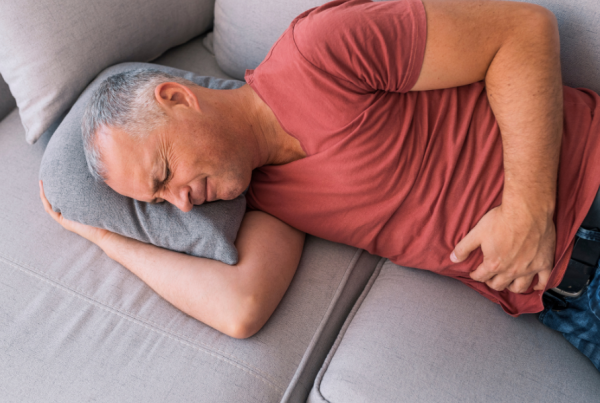Bowel Incontinence
Move Better. Live Fuller. Your Wellness Journey Starts Here.
Schedule a FREE Discovery Call!
What Is Bowel Incontinence?
Bowel incontinence, also known as fecal incontinence, is when you involuntarily pass stool or gas. It means you do not have control over your bowels or bowel movements (pooping), and therefore solid or liquid stool (poop) leaks out unexpectedly or even unknowingly.
Not only is stool leakage embarrassing, but it can also be indicative of a larger problem, so it is important to visit your provider to get to the root of the issue and learn how to manage or treat it. With that being said, let’s go over a few terms you may hear in relation to bowel incontinence.

Stool-Related Terms
- Bowel incontinence: A broad term that refers to the loss of control over bowel movements. It is also known as fecal incontinence.
- Anal incontinence: This is another term used interchangeably with fecal incontinence, but it can also include the inability to control the passage of gas. You may see “rectal incontinence” used as well.
- Accidental bowel leakage (ABL): This umbrella term refers to the involuntarily passing of fecal material, and is more commonly used in a clinical setting.
Gas-Related Terms
- Flatal incontinence or gas incontinence: The inability to control the passing of gas.
- Anal incontinence: As mentioned previously, this can be used to refer to gas incontinence as well.
- Rectal gas incontinence: Specifies the location from which the loss of control originates.
As you can see, the terminology varies slightly, but each refer to a loss of control or leaking of fecal material. There are two different levels of bowel incontinence:
- Minor incontinence: A milder form of incontinence; this involves the passing of either gas or a small amount of soiling from stool.
- Major incontinence: Refers to the uncontrollable loss of solid stool, and is a more severe form of incontinence.
Now that you’ve been given the terminology needed to understand this condition better, let’s look at the symptoms of bowel incontinence. Bowel and gas incontinence share some similar symptoms, but there are a few symptoms that are unique to each.
Symptoms of Stool or Gas Incontinence
- Unintentional passing of feces or gas: The primary symptom of incontinence is lacking control of the bowels.
- Urgency: A sudden intense need to empty the bowels, which may lead to incontinence in some situations.
- Frequency: Needing to go to the restroom more often (common with IBS).
- Soiling: Leakage or staining on clothes, which is more common with stool incontinence but may also occur occasionally with gas incontinence.
- Nocturnal incontinence: Involuntary leakage of stool or passing of gas during sleep.
Symptoms of Stool Incontinence
- A change in your bowel habits: This can include diarrhea or constipation.
- A feeling of incomplete evacuation: After a bowel movement, you may feel a sensation that the bowels are not completely empty.
- Rectal pain or discomfort: Often felt with the urgency to relieve the bowels or after experiencing incontinence.
Symptoms of Gas Incontinence
- Bloating and abdominal discomfort: Often felt alongside excessive gas until it is released.
What Causes Bowel Incontinence?
A variety of causes can bring on bowel incontinence. It can be life experiences such as surgery, childbirth, diet, or aging; it can also be related to gastrointestinal conditions, nerve damage, or muscle damage. Let’s take a closer look at each of the possible causes one by one:
Muscle Damage
- Anal sphincter damage: The anal sphincter is a muscle that controls the passage of stool. Damage to this muscle (which can occur during childbirth, surgery, or an injury) can lead to incontinence.
- Pelvic floor muscles: The pelvic floor supports the organs in the pelvis. These muscles can be weak, tight, or poorly coordinated—which is known as pelvic floor dysfunction. Weakness in these muscles can contribute to fecal and gas incontinence, especially in people who have had multiple pregnancies and vaginal births.
Nerve Damage
- Neurological disorders: Conditions such as multiple sclerosis, Parkinson’s disease, a spinal cord injury, or stroke can damage the nerves that control the anal sphincter or the sensation in the rectal area.
- Diabetes: Long-standing diabetes can cause nerve damage that affects bowel control.
Structural Changes or Obstructions
- Rectal prolapse: Occurs when a portion of the rectum protrudes through the anus, potentially causing incontinence.
- Rectocele: A bulging of the rectum into the vagina, which can complicate the control over bowel movements.
- Hemorrhoids: While primarily known for causing bleeding and discomfort, hemorrhoids can also interfere with the closure of the anal canal.
Functional Gastrointestinal Disorders
- Irritable bowel syndrome (IBS): IBS can cause episodes of diarrhea or constipation, both of which may lead to incontinence.
- Chronic constipation: Long-term constipation can lead to overflow incontinence, where liquid stool leaks past blockages of hard stool.
Other Causes
- Diarrhea: Watery stools are more difficult to hold than solid stools. Therefore, frequent cases of diarrhea can overwhelm the ability of the rectum to hold stool, leading to incontinence.
- Age: Muscle strength and nerve function in the anus and rectum can decrease with age, increasing the risk of incontinence.
- Surgery: Operations on or around the anus or rectum—such as for hemorrhoids, cancer, or inflammatory bowel disease—can lead to temporary or permanent incontinence.
- Childbirth: Especially after a difficult delivery or with the use of forceps, which can cause muscle or nerve damage.
Lifestyle Factors
- Diet: Consumption of certain foods and drinks can irritate the digestive system or increase gas production, contributing to incontinence.
Physical Therapy for Bowel Incontinence
While your primary provider may recommend dietary changes or medications to help alleviate symptoms of bowel incontinence, you should also consider physical therapy. Pelvic floor physical therapy can be a fantastic solution for bowel incontinence, as a common cause can be attributed to muscle dysfunction. As mentioned previously, incoordination of the pelvic floor muscles or a lack of control of these muscles can create gas or bowel incontinence.
To help alleviate these issues, your physical therapist will help you regain awareness and function of these muscles. This will include treatments such as neuromuscular re-education and biofeedback. Additionally, behavioral therapies and activities such as bathroom schedules can help you regain and maintain control of these muscles. Treating pelvic floor dysfunction isn’t just about retraining your muscles, but also identifying bowel habits that may contribute to your symptoms!
Your physical therapist will create an individualized exercise plan that best suits your needs. These exercises can help strengthen your muscles—not just for your pelvic floor, but also the surrounding supportive muscle groups—to allow better control and strength overall.
If you want to know more about physical therapy with Hive Therapy and Wellness, you can explore the following treatment methods:
- Exercise prescription
- Behavioral modifications
- Neuromuscular re-education
- Biofeedback
- Therapeutic activity
Bowel incontinence, also known as fecal incontinence, is when you involuntarily pass stool or gas.
It means you do not have control over your bowels or bowel movements (pooping), and therefore solid or liquid stool (poop) leaks out unexpectedly or even unknowingly.
Not only is stool leakage embarrassing, but it can also be indicative of a larger problem, so it is important to visit your provider to get to the root of the issue and learn how to manage or treat it.
With that being said, let’s go over a few terms you may hear in relation to bowel incontinence.
Stool-Related Terms
- Bowel incontinence: A broad term that refers to the loss of control over bowel movements. It is also known as fecal incontinence.
- Anal incontinence: This is another term used interchangeably with fecal incontinence, but it can also include the inability to control the passage of gas. You may see “rectal incontinence” used as well.
- Accidental bowel leakage (ABL): This umbrella term refers to the involuntarily passing of fecal material, and is more commonly used in a clinical setting.
Gas-Related Terms
- Flatal incontinence or gas incontinence: The inability to control the passing of gas.
- Anal incontinence: As mentioned previously, this can be used to refer to gas incontinence as well.
- Rectal gas incontinence: Specifies the location from which the loss of control originates.
As you can see, the terminology varies slightly, but each refers to a loss of control or leaking of fecal material. There are two different levels of bowel incontinence:
- Minor incontinence: A milder form of incontinence; this involves the passing of either gas or a small amount of soiling from stool.
- Major incontinence: Refers to the uncontrollable loss of solid stool, and is a more severe form of incontinence.
Now that you’ve been given the terminology needed to understand this condition better, let’s look at the symptoms of bowel incontinence. Bowel and gas incontinence share some similar symptoms, but there are a few symptoms that are unique to each.
Symptoms of Stool or Gas Incontinence
- Unintentional passing of feces or gas: The primary symptom of incontinence is lacking control of the bowels.
- Urgency: A sudden intense need to empty the bowels, which may lead to incontinence in some situations.
- Frequency: Needing to go to the restroom more often (common with IBS).
- Soiling: Leakage or staining on clothes, which is more common with stool incontinence but may also occur occasionally with gas incontinence.
- Nocturnal incontinence: Involuntary leakage of stool or passing of gas during sleep.
Symptoms of Stool Incontinence
- A change in your bowel habits: This can include diarrhea or constipation.
- A feeling of incomplete evacuation: After a bowel movement, you may feel a sensation that the bowels are not completely empty.
- Rectal pain or discomfort: Often felt with the urgency to relieve the bowels or after experiencing incontinence.
Symptoms of Gas Incontinence
- Bloating and abdominal discomfort: Often felt alongside excessive gas until it is released.
A variety of causes can bring on bowel incontinence. It can be life experiences such as surgery, childbirth, diet, or aging; it can also be related to gastrointestinal conditions, nerve damage, or muscle damage. Let’s take a closer look at each of the possible causes one by one:
Muscle Damage
- Anal sphincter damage: The anal sphincter is a muscle that controls the passage of stool. Damage to this muscle (which can occur during childbirth, surgery, or an injury) can lead to incontinence.
- Pelvic floor muscles: The pelvic floor supports the organs in the pelvis. These muscles can be weak, tight, or poorly coordinated—which is known as pelvic floor dysfunction. Weakness in these muscles can contribute to fecal and gas incontinence, especially in people who have had multiple pregnancies and vaginal births.
Nerve Damage
- Neurological disorders: Conditions such as multiple sclerosis, Parkinson’s disease, a spinal cord injury, or stroke can damage the nerves that control the anal sphincter or the sensation in the rectal area.
- Diabetes: Long-standing diabetes can cause nerve damage that affects bowel control.
Structural Changes or Obstructions
- Rectal prolapse: Occurs when a portion of the rectum protrudes through the anus, potentially causing incontinence.
- Rectocele: A bulging of the rectum into the vagina, which can complicate the control over bowel movements.
- Hemorrhoids: While primarily known for causing bleeding and discomfort, hemorrhoids can also interfere with the closure of the anal canal.
Functional Gastrointestinal Disorders
- Irritable bowel syndrome (IBS): IBS can cause episodes of diarrhea or constipation, both of which may lead to incontinence.
- Chronic constipation: Long-term constipation can lead to overflow incontinence, where liquid stool leaks past blockages of hard stool.
Other Causes
- Diarrhea: Watery stools are more difficult to hold than solid stools. Therefore, frequent cases of diarrhea can overwhelm the ability of the rectum to hold stool, leading to incontinence.
- Age: Muscle strength and nerve function in the anus and rectum can decrease with age, increasing the risk of incontinence.
- Surgery: Operations on or around the anus or rectum—such as for hemorrhoids, cancer, or inflammatory bowel disease—can lead to temporary or permanent incontinence.
- Childbirth: Especially after a difficult delivery or with the use of forceps, which can cause muscle or nerve damage.
Lifestyle Factors
- Diet: Consumption of certain foods and drinks can irritate the digestive system or increase gas production, contributing to incontinence.
While your primary provider may recommend dietary changes or medications to help alleviate symptoms of bowel incontinence, you should also consider physical therapy.
Pelvic floor physical therapy can be a fantastic solution for bowel incontinence, as a common cause can be attributed to muscle dysfunction. As mentioned previously, incoordination of the pelvic floor muscles or a lack of control of these muscles can create gas or bowel incontinence.
To help alleviate these issues, your physical therapist will help you regain awareness and function of these muscles. This will include treatments such as neuromuscular re-education and biofeedback.
Additionally, behavioral therapies and activities such as bathroom schedules can help you regain and maintain control of these muscles. Treating pelvic floor dysfunction isn’t just about retraining your muscles, but also identifying bowel habits that may contribute to your symptoms!
Your physical therapist will create an individualized exercise plan that best suits your needs. These exercises can help strengthen your muscles—not just for your pelvic floor, but also the surrounding supportive muscle groups—to allow better control and strength overall.
If you want to know more about physical therapy with Hive Therapy and Wellness, you can explore the following treatment methods:
- Exercise prescription
- Behavioral modifications
- Neuromuscular re-education
- Biofeedback
- Therapeutic activity
You can learn more about these treatments on our Treatments Page.





